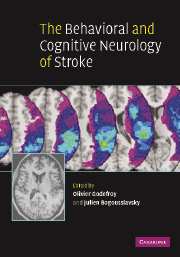Book contents
- Frontmatter
- Contents
- Contributors
- Preface
- 1 Evaluation of cognitive and behavioral disorders in the stroke unit
- Motor and gestural disorders
- Aphasia and arthric disorders
- Hemineglect, Anton–Babinski and right hemisphere syndromes
- 9 Hemispatial neglect
- 10 Anosognosia and denial after right hemisphere stroke
- 11 Asomatognosia
- 12 Disorders of visuoconstructive ability
- 13 Topographical disorientation
- Agnosia and Bálint's syndrome
- Executive and memory disorders
- Behavioral and mood disorders
- Dementia and anatomical left/right syndromes
- Index
- References
11 - Asomatognosia
Published online by Cambridge University Press: 10 October 2009
- Frontmatter
- Contents
- Contributors
- Preface
- 1 Evaluation of cognitive and behavioral disorders in the stroke unit
- Motor and gestural disorders
- Aphasia and arthric disorders
- Hemineglect, Anton–Babinski and right hemisphere syndromes
- 9 Hemispatial neglect
- 10 Anosognosia and denial after right hemisphere stroke
- 11 Asomatognosia
- 12 Disorders of visuoconstructive ability
- 13 Topographical disorientation
- Agnosia and Bálint's syndrome
- Executive and memory disorders
- Behavioral and mood disorders
- Dementia and anatomical left/right syndromes
- Index
- References
Summary
General presentation of the disorders of bodily awareness
The sense we have of our own bodies is of a very complex nature. French psychiatrist Henri Ey (1973) wrote: “In this sector of sensibility, neither the primary sensorial organ, neither the specific modality, neither especially the distinction of the subject and the object, are clear notions.” In fact, it is through its pathologies that our bodily sense came to be known as a useful theoretical construct.
In this chapter we will use the term asomatognosia as the general heading for the disorders of bodily awareness, where one's body may be perceived in an unusual manner, or not perceived as having changed in its functions. Following neurological damage, the body can be entirely or partly forgotten, ignored, denied, disowned, or misperceived. These disorders have proven notoriously difficult to organize and classify. What is more, the topic of asomatognosia is confounded with those of hemineglect, anosognosia, delusions, and more generally all disorders of the awareness of the self. A framework will be proposed in order to see things clearer in this multifaceted topic that draws its unity from phenomenological resemblance, organic overlap, and presumably common mechanisms ranging from sensorimotor functions to higher cognition. Hence, we will state that asomatognosia, roughly defined as the disturbances of the body schema, encompasses a wide array of clinical pictures under a unitary conceptual framework.
- Type
- Chapter
- Information
- The Behavioral and Cognitive Neurology of Stroke , pp. 215 - 253Publisher: Cambridge University PressPrint publication year: 2007
References
- 7
- Cited by



